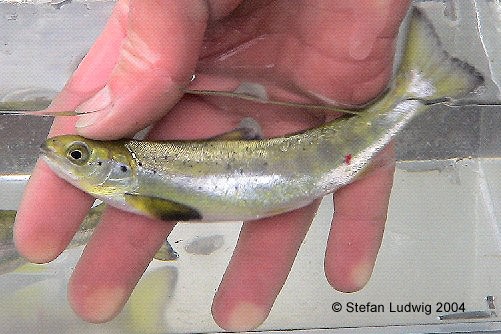Fishmonitoring
| ...is a task where there are a
lot of items to be researched. On this site there is to be shown a little
bit about it.
|
|||
 |
A lot of projects were occupied with the subject of fishmigration. The returnrate of adult spawners ist about 3- 5 % in natural undisturbed rivers. What influence do have the obstacles on this already small returnrate by nature ? Salmonreintroductionprojects at the rivers Elbe, Leine and Sieg in Germany already had success with returning spawners. In these rivers there are very few or no obstacles. The question is to what extend to the obstacles take influence on the migration of fishspecies.
picture on the left : salmonsmolt marked with red colormark |
||
|
In the river Oker (Weser-watershed) there was an observationprogramm being made in teamwork with the "Niedersächsischen Landesamt für Ökologie (NLÖ - today LAVES)" english : Countryoffice of lower-saxony for ecology, and the Danmarks Center for Vildlaks (DCV) english: danish center for wild salmon, the "Niedersächsischen Landesamt für Wasserwirtschaft und Küsten- und Naturschutz (NLWKN)" english: Countryoffice for watereconomics and coastal-and natureprotection and with the members of the Aller-Oker-Salmon--Community.
|
In the river Ems and in the Leda-Juemme-Area
there is a teamwork with the DCV
(Danmarks Center for Vildlaks) und the Members of the "Arbeitsgemeinschaft für Fischarten- und Gewaesserschutz in Norddeutschland (AFGN)"
englisch : Workinggroup for Fishspecies- and Waterprotection. Oberservation
of smoltmovements is done in a different way. In specially built netcages
the smolts are tawn in to the sea passing nets and weirs to see wether the
rate of returning spawners will rise.
|
||